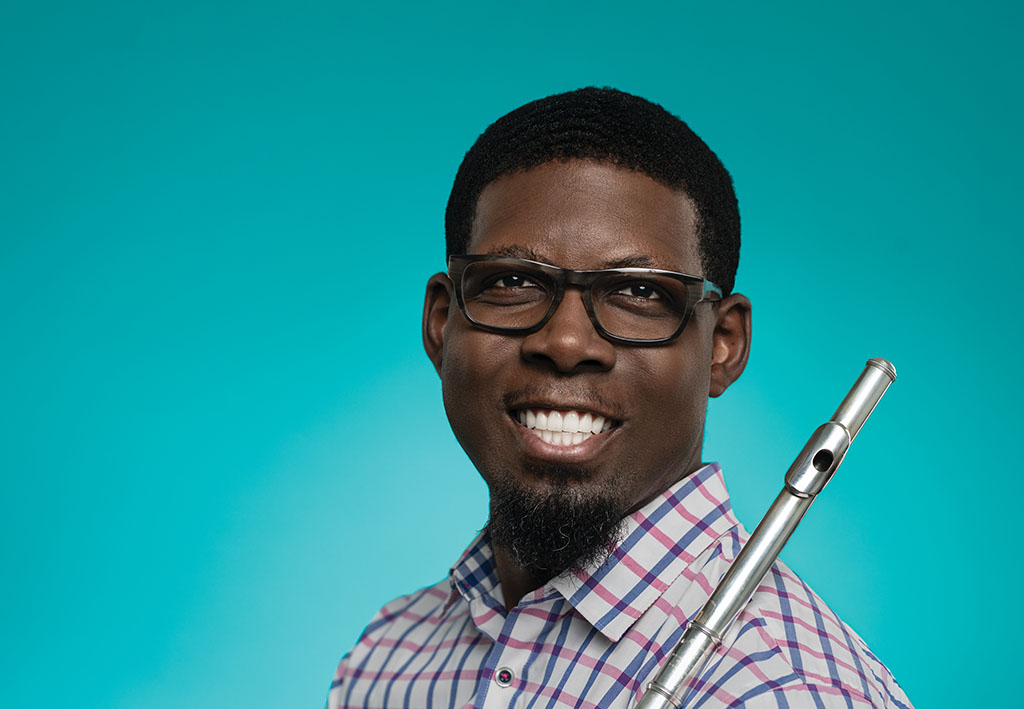Dr. Ceylon Mitchell II
As a member of the Levine Music faculty, flutist Ceylon Mitchell is inspiring the next generation of musicians while breaking down barriers in the classical music industry. Born in Anchorage, Alaska, Ceylon’s first exposure to playing music was like many Americans: with the recorder in his elementary school’s music class. This sparked an interest he continued to explore in middle school when he elected to take band.

“I like to say the flute chose me. My mom took me to the local music store, The Horn Doctor, to choose an instrument and someone in the store was playing a flute. Before I even saw what instrument was making that sound, I knew that was what I wanted to play.” — Ceylon Mitchell
Although his interest in the flute came naturally, playing it did not. Ceylon describes himself as a “late bloomer,” and says that learning how to produce sound with the flute took patience, a value he instills in his students. When it comes to curiosity and dedication to learning, Ceylon leads by example. A self-described “multi-hyphenate,” he has always balanced a variety of interests. In school, Ceylon had a strong interest in math and physics and even spent a year at Boston University as a D1 track and field athlete. “In some multiverse there is a version of me who is an engineer,” he jokes. In this universe, he is a flute instructor and Chair of the Woodwinds department at Levine, the flute professor at Bowie State University, a performer with multiple chamber groups, and an entrepreneur who does photography, web design, and marketing.
It was that intellectual curiosity that led him to Latin folk music. While working on his second master’s degree at the University of Maryland, he wrote a research paper focused on the Cuban flute traditions of charanga music, which opened him up to a whole new world and the flute’s history in that country. As Ceylon continued his academic pursuits, going on to earn his Doctorate (DMA) and participate in Strathmore’s Artist-in-Residence program, he continued to collaborate with other artists and deepen his relationship with Afro-Latin music.
During this time, he was approached by musicians to join the onstage band for a production of Gimme a Band, Gimme a Banana!: The Carmen Miranda Story. He says this experience was a “trial by fire” in performing Brazilian music and provided the opportunity to build relationships with Brazilian musicians and others well-versed in the genre. Outside of performing publicly, this community of performers often gathered in one another’s home to enjoy the food and music of their cultures, known as rodas de choro, which gave Ceylon an opportunity to learn the genre’s fundamentals in a safe, playful environment.
“As you build relationships with people, they can see you’re serious in your interest and respect in their culture, and they trust the way you honor their culture. I’m just a guest who’s grateful to be there and take it all in and take out my flute and learn by doing.” — Ceylon Mitchell
In 2019, Ceylon was awarded an artist fellowship grant by the Prince George’s Arts & Humanities Council, which he used to platform these musicians and Afro-Latin music in the wider community. The music collective, Raíces Negras, was formed. The collective of ensembles celebrates Black and Latine voices across the Americas with chamber music repertoire spanning from contemporary classical music to contemporary Pan-American jazz. For Ceylon, this was an opportunity to spotlight and collaborate with these cultures and their people, break down barriers, and redefine the genres of music you hear in concert halls. The collective continues to perform around the DMV and includes programs on the classical music of Brazil and Cuba as well as the Brazilian Choro and Cuban Charanga traditions.
On a mission to celebrate marginalized identities in music, especially Black and brown voices, Ceylon’s diverse repertoire spans from Western European classical to living cultural traditions across the Americas, along with everything in between. He also helps to widen the repertoire of Levine students as a member of our Community and Accessibility Working Group. Through his performances and collaborations, Ceylon is challenging traditional notions of classical music and creating a more inclusive musical landscape.
“My advice to anyone looking to get into any kind of music is to gather in informal settings and learn the fundamentals in a safe environment with a mindset of play versus perfection. It’s about having fun and enjoying what the music is all about and where it comes from.” — Ceylon Mitchell
Levine’s community portraits are a rotating showcase of students, alumni, and faculty members displayed at our Northwest DC campus. The individuals photographed are just a small sample of the many extraordinary people who make up the Levine Music community. From teachers with storied careers to students looking toward the future, their journeys are ones of determination, passion, and collaboration.
